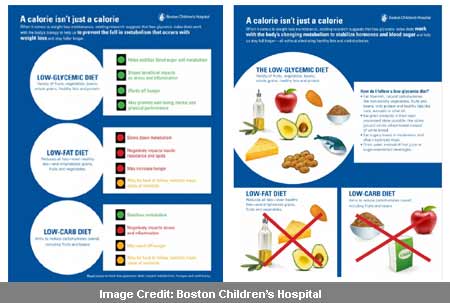Many people attaining weight loss have trouble sustaining it for a long time and according to professionals from Boston Children’s Hospital, it is because all calories may not be the same. Simply put, the investigators revealed that a low-glycemic diet matching a person’s metabolic status could help shed off those stubborn kilos.
It has been noted that once weight loss is achieved, the body loses its ability to burn calories at a faster rate. This makes it difficult to maintain the lost weight. The idea is to follow a diet pattern that could work in tandem with the body’s altering metabolism, making people shed off calories even after they have lost weight.
David Ludwig, MD, PhD, from the New Balance Foundation Obesity Prevention Center Boston Children’s Hospital, remarked, “Recommendations for low-fat diets have been based on very little evidence. Reducing all fats can actually be counterproductive, and keeping healthy fats like nuts, olive oil and avocados in the mix can add flavor, too.”
A low glycemic diet includes natural food, good quality proteins, fats and carbohydrates. It has shown promise in maintaining steady blood sugar levels in the body. Going by the present study, it was observed that such a diet seemingly helped participants maintain weight loss. Besides, it made them feel satiated for a longer time and enhanced their mental as well as physical performance, as compared to other forms of diets like low-fat or low-carb.
Considering a low-glycemic diet constitutes natural ingredients, it’s quite easy to follow this food type. Consuming fiber, fruits, non-starchy vegetables, nuts, legumes, grain products, moderate sugar and no fruit juices or sodas is what the diet is all about.

